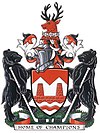Trail, BC
| Trail | ||
|---|---|---|
| City | ||
| City of Trail | ||

Trail BC welcome sign
|
||
|
||
| Motto: Explore Your Trail | ||
 Location of Trail in British Columbia |
||
| Coordinates: 49°05′50″N 117°42′38″W / 49.09722°N 117.71056°W | ||
| Country |
|
|
| Province |
|
|
| Region | Kootenays | |
| Regional district | Kootenay Boundary | |
| Government | ||
| • Type | Elected city council | |
| • Mayor | Mike Martin | |
| • Governing body | Trail City Council | |
| • MP | Alex Atamanenko (NDP) | |
| • MLA | Katrine Conroy (BC NDP) | |
| Area | ||
| • City | 34.93 km2 (13.49 sq mi) | |
| Elevation | 440 m (1,440 ft) | |
| Population (2011) | ||
| • City | 7,681 | |
| • Density | 219.9/km2 (570/sq mi) | |
| • Urban | 9,276 | |
| Time zone | PST (UTC-8) | |
| Forward sortation area | V1R | |
| Area code(s) | 250 / 778 / 236 | |
| Highways |
3B 22 |
|
| Waterways | Columbia River | |
| Website | City of Trail | |
Trail is a city in the West Kootenay region of the Interior of British Columbia, Canada. It was named after the Dewdney Trail, which passed through the area.
Trail has an area of 34.78 square kilometres (13.43 sq mi). The city is located on both banks of the Columbia River, approximately 10 km north of the United States border. This section of the Columbia River valley is located between the Monashee Mountains to the west and the Selkirk Mountains to the east. The Columbia flows directly north-south from Castlegar, turns east near downtown Trail, and then meets the Canada–United States border at Waneta and the Pend d'Oreille River.
Summer climate in Trail is generally hot and dry with moderately cool nights. Temperatures often exceed 35 °C during summer afternoons, average 29 °C. Thunderstorms are common during the late-Spring and Summer season, often moving into the valley from the south. The fall months brings dense river fog, especially during the overnight and morning hours, as a cold air inversion lingers above the relatively warm river surface. Winters are mild to cold with periods of moderate snowfall. Nearby villages such as Warfield and Fruitvale often receive greater amounts of snow due to higher elevation.
The Monashee Mountains are the first major mountain range east the Coastal Mountains to intercept moisture laden westerly flow from the Pacific Ocean. As a result, areas west of Trail, including the Christina Range, Rossland Range, the city of Rossland, and the Blueberry-Paulson section of the Crowsnest Highway (Highway 3) receive greater amounts of winter precipitation, mostly in the form of heavy snow. Vegetation in the Trail area, although fairly lush, is noticeably drier than other areas with a more westerly aspect.
...
Wikipedia

